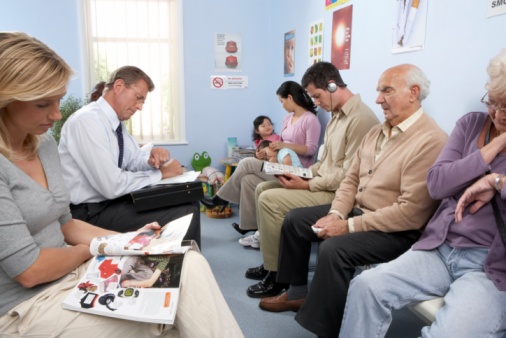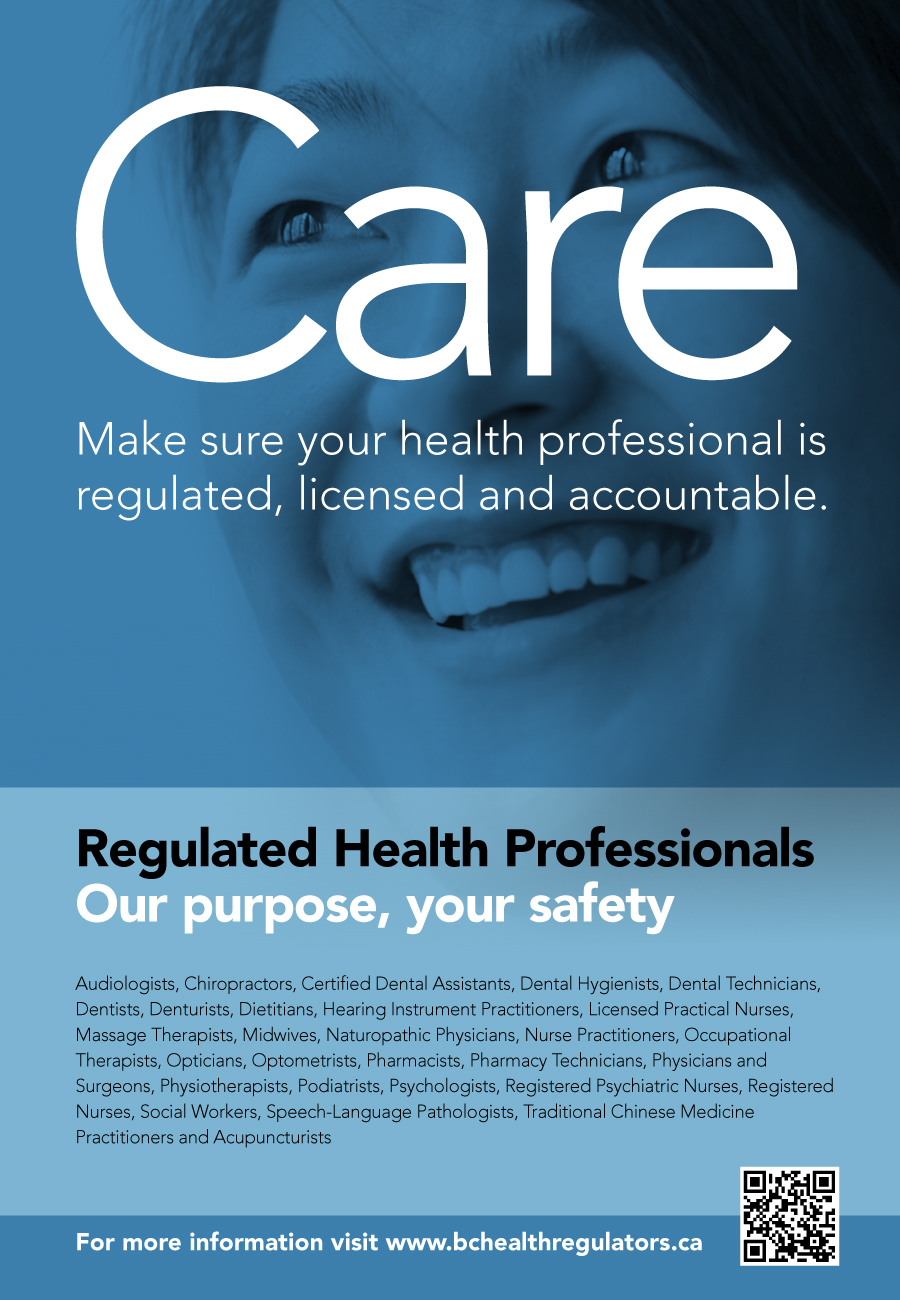Seeing a qualified health care professional is something many of us take for granted, but how can you ensure the physician, dentist or acupuncturist you are seeing is trustworthy?

A number of recent high profile cases involving individuals posing as health care professionals has left their former patients on the edge, worried about the possibility of exposure to life-threatening infections.
While in most of these cases the warnings to the public came after the investigations had been launched, health regulators say there are things you can do to preempt the problem and make sure you are seeing a health professional who is certified and regulated.
The Registrar for the College of Physicians and Surgeons of BC Dr. Heidi Oetter says anyone can go to their website www.cpsbc.ca and look up a physician’s name, which will reveal their registration status with the college, their certification and whether there is any regulatory action against them.
Oetter says the website also lets a patient file a complaint against a registrant or an impostor. Complaints they receive range from inadequate treatment, unprofessional conduct, breached confidentiality of medical records to concerns of sexual nature.
Oetter says the College of Physicians and Surgeons of BC receives about a thousand complaints a year, and two thirds of the time, they find no grounds for intervention.
Oetter says in other cases, a physician may be required to undergo some kind of remediation or education to ensure the incident does not happen again. A practitioner may also be asked to write a letter of apology to the patient if they were rude or their conduct fell short of the mark.
“In a small number of instances, we may actually discipline the physician, which would mean that we would publicly reprimand them,” says Oetter. “And there may be a requirement for limits and conditions to be imposed upon the physician’s practice and they may be suspended for a period of time.”
But Oetter says it may take as long as nine months to review a single complaint.
While a physician is under investigation, their record will not necessarily reflect that.
Cynthia Johansen, Registrar for the College of Registered Nurses of BC, says they want people to go to their website and seek out information about their health practitioners just like they would research a new iPhone. “They are consumers of all sorts of items, including health services,” she adds.
Johansen says they are trying to drive the point that if a patient is dissatisfied with the service they are getting, there is a place for them to go and there are standards they should expect.
“You take for granted to some extent that your health care professional is someone to trust. But understanding where that trust lies is that extra leap that we want people to start to make.”
Helping British Columbians make that leap is the mandate of a new society called BC Health Regulators.
In February 2014, B.C.’s 26 regulated health professions, governed by 22 colleges, incorporated under the Society Act to become the Health Profession Regulators of B.C. Society.
Almost 100,000 health care experts in British Columbia work in positions that require a professional license, and the job of BC Health Regulators is to ensure patients can expect qualified, ethical and safe care from regulated heath care providers.
They have now launched a public awareness campaign including closed captioning, social media and bus shelter ads to target people – like new immigrants – who may not necessarily be aware they have an option to learn more about their treating professional.
See below: One of BC Health Regulators ads designed to spread awareness
Red flags in the system
The last few years saw a number of highly publicized cases, where individuals were either practicing illegally or negligent in their job.
In August 2013, it was made public that Burnaby resident Tung Sheng Wu, also known as David Wu, was practising dentistry without a licence, and was not properly cleaning or sterilizing his instruments. His patients were advised to get tested for Hepatitis B, Hepatitis C, and the Human immunodeficiency virus (HIV).
READ MORE: A look inside Tung Sheng (David) Wu’s illegal dental clinic
Wu went into hiding, but finally turned himself into Toronto police and was given a jail sentence.
He has never been registered with the College of Dental Surgeons of B.C., but is believed to have been practising dentistry illegally in this province for many years.
WATCH: College of Dental Surgeons of British Columbia investigates the illegal dental practice of Tung Sheng (David) Wu
In December, two more illegal dentists were identified. Vladimir Shapoval of Coquitlam was sentenced to 45 days in jail and ordered to pay $35,000 to the College of Dental Surgeons. Shapoval was found to be practising dentistry despite an existing injunction. In another investigation, Hua Zheng Huang of Vancouver was also found to be practicing dentistry illegally out of his house. He consented to the imposition of a permanent injunction against him.
Neither Shapoval nor Huang has ever been registered as a dentist in B.C.
In October, an investigation was launched after a six-year-old girl was possibly exposed to HIV during a routine vaccination. The girl’s father says when the nurse gave his daughter the needle, it went into the child’s arm and then into the nurse’s hand by accident. When the nurse drew the needle back through the child’s arm there was blood exchanged. The father says he was horrified to learn the nurse is HIV positive.
And in the latest case earlier this month, patients who received acupuncture services at the Acupuncture and Chinese Medicine Centre in Abbotsford were advised to be tested for Hepatitis B, C and HIV.
An investigation found Duan (Deborah) Hu did not meet infection prevention and control standards during treatments. Hu’s license was suspended pending the completion of an investigation. There are seven other registrants suspended and currently under investigation as listed on the website of the College of Traditional Chinese Medicine Practitioners and Acupuncturists of BC.
Pro-active audits
When it comes to registered heath care professionals like Duan Hu who breach control standards in their practice, what, if anything, can their College do?
In addition to licensing and complaint review, some colleges conduct pro-active audits of their registrants.
In a three-year period, the College of Physicians and Surgeons of B.C. has pro-actively assessed about 2,000 physicians out of the 12,000 currently practicing in B.C.
Oetter says they assess about five per cent of the doctors each year and plan to increase that number over the next few years.
She says some of the audits are random, but some are more focused.
“We are focusing our activities on older physicians or physicians who work in isolated practices, where they may not have the benefit of peer interaction.”
The College of Registered Nurses of BC says their 300 nurse practitioners have to undergo an on-site review in their first year of practice and every five years after that.
“That’s where someone actually goes into their practice environment, randomly selecting patients files, reviewing their practice and giving them feedback,” says Johansen. “And if there are significant concerns about safety, the college is alerted and we take action.”
For the 37,000 practicing nurses registered under their College in B.C., there is a separate, annual process that involves self-reflection and peer feedback.
She says the quality assurance programs are supposed to prevent issues, because “you are working on it constantly versus waiting for a complaint to come to the College.”





Comments